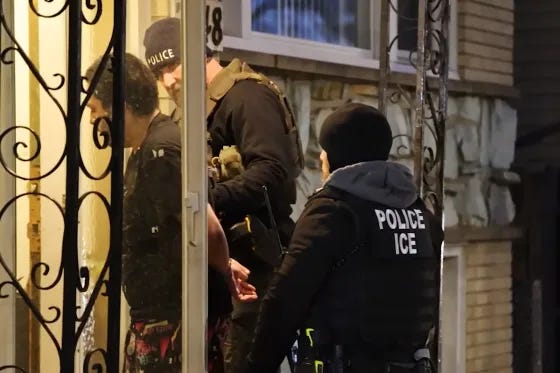ICE Raids Target Major U.S. Cities as Trump Administration Accelerates Immigration Enforcement
A record 956 arrests were made in one day, marking the largest number of immigration arrests under the Trump administration.
As President Donald Trump returns to office, immigration enforcement operations are intensifying, with U.S. Immigration and Customs Enforcement (ICE) conducting sweeping raids in cities across the United States. On Sunday alone, ICE arrested 956 individuals—the highest number of arrests in a single day under the Trump administration—bringing the total number of arrests since inauguration to at least 2,681.
While the Trump administration claims these actions target criminals, concerns have arisen over the arrest of law-abiding migrants and individuals with legal permits. ICE officials have not provided specific numbers distinguishing between those with criminal backgrounds and those without.
Here’s an overview of where these arrests are taking place:
Chicago
In Chicago, ICE initiated a series of crackdown operations on Sunday. Among those arrested, six were convicted of serious offenses, including murder and aggravated sexual battery, while others were identified as gang members. Operations continued into Monday, with 10 teams of federal agents working throughout the city, aided by multiple federal agencies. As a sanctuary city, Chicago prohibits local police from cooperating with federal immigration authorities. Mayor Brandon Johnson confirmed that Chicago police were not involved in the ICE operations. Illinois Governor JB Pritzker expressed his support for deporting those convicted of violent crimes but criticized the targeting of law-abiding immigrants.
Los Angeles
In Los Angeles, Homeland Security Investigations and the DEA coordinated with partners for law enforcement operations in line with Trump’s immigration policies. The city has a sanctuary city ordinance that limits the use of city resources in assisting federal immigration enforcement.
Phoenix
The DEA's Phoenix office reported its involvement with the Department of Justice and Department of Homeland Security in immigration efforts, sharing photos of law enforcement agents executing arrests.
San Diego
ICE operations in San Diego also resulted in arrests, with the DEA’s San Diego office sharing images of agents detaining individuals.
Denver
In Denver, the DEA’s Rocky Mountain Field Division executed a search warrant at a makeshift club, arresting 41 individuals, most of whom were found to be in the U.S. illegally. The operation targeted members of the Venezuelan gang Tren de Aragua.
Miami
In Miami, ICE made several arrests on Sunday, including individuals with criminal charges such as aggravated assault and possession of a controlled substance. ICE’s Miami office highlighted their successful collaboration with other federal agencies to enforce U.S. immigration laws.
Atlanta
In Atlanta, the DEA supported the Department of Justice and Homeland Security in an operation that resulted in the arrest of Honduran immigrant Wilson Rogelio Velásquez Cruz, who had been living in the U.S. under a valid work permit while awaiting asylum. Cruz’s arrest has raised concerns as he had not previously faced detention.
Texas
ICE conducted “targeted operations” in various Texas cities, including Dallas, Irving, Arlington, Fort Worth, and Collin County. These operations led to the arrest of at least 84 individuals, many of whom were targeted for criminal backgrounds. However, some arrests were “collateral,” involving individuals found in the same locations as those targeted.
San Juan, Puerto Rico
San Juan Mayor Miguel Romero expressed solidarity with those affected by the operations but confirmed that neither municipal police nor the local government were involved in the raids. Romero’s administration pledged to offer resources such as citizenship classes and legal assistance to ensure residents' rights were respected.
As ICE continues its raids in these cities, immigrant rights advocates and local officials are raising concerns about the impact on vulnerable populations. While the Trump administration focuses on enforcing immigration laws, many are calling for a more humane approach to immigration enforcement that recognizes the complexities of individuals' legal statuses.


